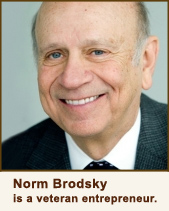By Norm Brodsky
Published: Aug 1, 2000, Inc. magazine
http://www.inc.com/magazine/20000701/19563.html
Editor's Note: Brodsky was a hero to me as I built my business. I read his monthly column in Inc. magazine religiously and he rarely failed to teach me something I either didn't know or was in need of a reminder. While an incredibly simple article, this one is no different. Beward the plan that has no "first step." [more]
 The First Step
The First Step
By Norm Brodsky
There's so much to do when you're starting a company that the hardest part may be figuring out what to do first. CEO Norm Brodsky advises that, before getting sidetracked by the details, you need to formulate clear goals for your business.
Sometimes the hardest part of starting a business is figuring out where to begin
I see a lot of people who are setting out on their first or second business venture, and I've noticed that most of them face the same challenge. They don't know where to begin. They have so many ideas, they see so many opportunities, and they're so excited about the possibilities and fearful of the risks that they have trouble figuring out what they should do first. Typically, they wind up wasting time on details that give them the illusion of progress without getting them any closer to their goal.
My wife's friend Roni is a good example. She came to me a few months ago looking for advice. She'd once owned a store that sold gift items, but she closed it after about eight years and began searching for another venture. She wanted to do something related to health and wellness. After checking out various possibilities, she decided to go to school and become a licensed masseuse. Following her graduation, she asked me to help her figure out how to get her new business up and running.
By the time we sat down together, Roni had already done a lot of thinking, as I quickly discovered. She presented me with several pages of notes laying out her ideas along with all kinds of numbers and costs that I couldn't make heads or tails of. She had a whole slew of business opportunities she wanted to go after -- so many, in fact, that she would have needed a staff of 20 to tackle them all.
On the practical side, she'd bought a massage table, set up a massage room in her home, and signed up three or four regular customers. In addition, she had a relationship with a day spa where she went one day a week to give massages to its patrons.
And one other thing: she'd spent a lot of time designing her business card. She showed me five different versions that she'd printed up. "Which one do you like best?" she asked.
"None of them," I said and picked out the simplest of the bunch. "You can use this one."
"But that's just a plain card," she said.
"It has your name, your business, and your phone number," I said. "What more do you need? You're not setting up a company to sell business cards. If it takes you more than five minutes to design one, you're doing something wrong."
I don't mean to pick on Roni. People starting out in business often spend an inordinate amount of time thinking about business cards, designing logos and stationery, choosing furniture, and so on. I suppose it's natural to focus on things that seem familiar and controllable when you're facing a challenge you find overwhelming, but there are better ways to deal with your anxieties.
To begin with, you need to understand that building a business is a series of steps. No one gets to the top of the mountain in one leap. You climb from plateau to plateau, and eventually you reach the summit.
So you have to start by focusing on the first plateau. You have to figure out where it is and then come up with a plan for getting to it.
I'm talking about a plan that can be accomplished in a reasonable time period (months, not years), one that will allow you to take advantage of your strongest assets and will put you in a good position to move on to the next plateau, whatever that turns out to be.
Before you can create such a plan, however, you have to be clear about your goal -- your immediate goal, that is, the one that marks the first plateau.
That's where most people run into trouble. Sometimes they're looking too far up the mountain to see the goal. More often they're blinded by all the opportunities around them.
Roni, for one, had more opportunities than she could handle. She wanted to set up a home-based massage business; provide a part-time massage service to spas and physical therapists; teach parents how to do infant massage; give massages at birthday parties, special occasions, and corporate events; and on and on.
I said, "These are wonderful ideas, Roni, but you can't do them all now. So what do you want?"
"What do you mean?" she said.
"I mean, what do you want in your life -- today?"
She thought a moment. "Well, it would be really nice if I could make $400 a week from this business," she said. "And I don't want to work every day. I want my leisure time."
"OK, fine," I said. "You can do that. Let's look at these business opportunities and figure out how."
Clearly, a home-based business was ideal. At an average of $50 a visit, Roni would need to give only eight massages a week to hit her goal. She could control her schedule. She'd have repeat customers. She could go on vacation. On the other hand, it would take time to build a customer base large enough to provide her reliably with the amount of business she wanted.





